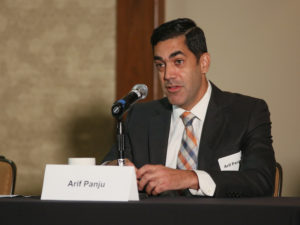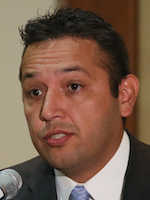Bipartisan coalition looks to 2023 after mixed success in 2021
Advocates who pushed for changes to Texas’s public information laws at the legislature this year are celebrating a handful of wins but fell short on some of their agenda.
Two new transparency laws took effect September 1st, the fruit of a bipartisan effort: Senate Bill 930 by state Senator Judith Zaffirini (D-Laredo), which ensures that families of nursing home residents have access to information about outbreaks of communicable diseases within the facilities; and Senate Bill 1225 by Senator Joan Huffman (R-Houston), which tightens the catastrophe exception in Texas Public Information Act.

But at least seven other bills called for by journalists, media lawyers, and other stakeholders fell short, including House Bill 2383, which would have closed the “dead suspect loophole,” and House Bill 1810, which would have allowed the public to receive data in a sortable format, such as Excel—a change that would be particularly beneficial to data journalists.
While politics and policy played into this outcome, the extraordinary circumstances of the legislative session also were a factor. The 87th Legislature convened in January 2021 in the midst of the peak winter surge of Covid-19, which was killing more than 300 Texans per day. Lawmakers at the Capitol were tested daily for Covid-19, and masks were generally required. Some members participated in hearings and floor votes remotely, limiting face-to-face contact.
The winter storm in mid-February also interrupted the session, costing lawmakers a week and diverting the policy focus of the session to grid reform and other storm-related bills. After the legislature adjourned its regular session May 31, lawmakers were consumed throughout the summer by a bitter partisan fight over voting rules, and in the fall by redistricting. The three special-called sessions so far this year have therefore not provided any opportunity to revisit public information bills. Further, the legislature may only consider items the governor puts on the agenda for special-called sessions.
Information on outbreaks
Open government advocates gathered September 24th at the annual conference of the Freedom of Information Foundation of Texas, where they discussed the limited successes of the legislative session. Representative Joe Moody (D-El Paso) and Land Commissioner George P. Bush, who is running for Attorney General, also addressed the conference.
Senator Zaffirini delivered an address via recorded video, owing to a scheduling conflict. She discussed the origin of her bill, SB 930, saying, “When the COVID-19 pandemic began last year my staff and I began receiving reports that family members were being denied access to information about the safety of nursing homes where their loved ones resided.”
“I can only imagine the anxieties those families felt. As we investigated, we learned that advocates and journalists also were being denied access to information by state and local government officials. That’s why some of you and I decided to address this issue by filing my Senate Bill 930. Thank God it was signed by the governor and became effective September 1.”

The final vote on the bill was 142-1 in the House and 30-0 in the Senate. “We had tremendous supporters on this,” said attorney Laura Prather, a board member of FOIFT and head of media law practice at Haynes & Boone. “I think people saw the need and wanted to rectify the problem. I only wish we could have done it for the jail system as well.”
Remote working
Advocates also won unanimous support for SB 1225, which deals with the circumstances under which government bodies can claim a catastrophe exemption to the Public Information Act. The legislature had tweaked the law after Hurricane Harvey to give governments some breathing room after a disaster, in case staff were displaced or an office flooded, for example. “You can see how that would make sense under the circumstances of a Hurricane Harvey situation,” Prather noted.
However, “What happened when COVID hit is tons of different organizations put in catastrophe notices with the AG’s office and then just renewed them and renewed them and renewed them, which is never what the law was intended to do,” Prather said. “Organizations were taking advantage of the system.”

The bill, carried by Senator Huffman in the Senate and Representatives Chris Paddie (R-Marshall), Richard Raymond (D-Laredo), and Terry Canales (D-Edinburg) in the House, says that “’Catastrophe’ does not mean a period when staff is required to work remotely and can access information responsive to an application for information electronically, but the physical office of the governmental body is closed.”
Redactions of information
Open government advocates celebrated not just the passage of these two bills but the defeat of another, SB 1492, which dealt with redactions from public information requests and the process by which a local government or state agency can black out requested information.
Under current law, governments may invoke exceptions under the TPIA but usually must clear the redaction with the Attorney General’s Office. SB 1492 would have changed that to allow them to redact first without seeking an opinion.

Senator Robert Nichols (R-Jacksonville), who laid out the bill on behalf of author Senator Paul Bettencourt (R-Houston), said at a hearing April 24th, “Under current law even the most routine noncomplex public information exceptions to disclosure must be sent to the Attorney General for opinion. This results in a backlog of opinion requests. SB 1492 is intended to expedite the information request by offering an alternative procedure whereby government body that receives a public information request may withhold or redact information that falls under a routine exception.”
But the Texas Association of Broadcasters objected to the bill. Stacy Allen told the committee, “In school you don’t get to grade your own paper, and that’s precisely what this bill would allow governmental entities to do, by making an initial determination on their own, without the legal advice of the attorney general, as to what can and cannot be withheld in response to a public information request. This would be a sea change to a process that has been in place for over 30 years and has served the public well.”

Likewise, FOIFT President Arif Panju slammed this bill, suggesting it would shift the burden from the government to the requestor by requiring the requestor to make an affirmative second request to appeal a redaction. “Making an open records request is asking for information you’re entitled to. Being told no and then kicking it off in an appellate posture with the Attorney General of the State of Texas might be easy for a civil rights lawyer like me—it’s not easy for most Texans. So, what the bill sought to do was flip the presumption that you’re entitled to public information.”
Prather said there were other ways to accomplish what the bill was trying to do. “The motivation for that bill was to address the workload at the AG’s office. And the way we saw that was then you need to address the bad actors, you need to address those governmental entities that are taking advantage of the system and kicking everything up to the AG’s office every single time they can and really inundating that office with so much unnecessary work. That is the core of the problem. Not the requestor.”
“We proposed some alternative language that would…collect data on what governmental entities are habitually making wholesale arguments to avoid responding to TPIA requests.” Local governments that abuse the system should be penalized financially, she suggested.

James Quintero, a policy director at the conservative Texas Public Policy Foundation (TPPF), agreed with this approach, saying, “the Attorney General’s office could assess you some type of fine or fee to account for continually pestering them with the same exception or the same request.”
TPPF was part of the Texas Freedom of Information Foundation’s open government coalition, which went by the name Sunshine Coalition in 2019 and Transparent and Accountable Government Coalition in 2021.
Senate Bill 1492 and its companion bill in the House died in committee.
Dead suspect loophole
On the other hand, open government advocates suffered a setback with the defeat of a bill by Representative Moody that would have closed the “dead suspect loophole,” a provision of the Public Information Act that shields information in pending criminal cases and in closed cases that do not result in a conviction.
The law in question, Section 552.108 of the Texas Government Code, requires law enforcement to release only “basic information” about arrests and arrested persons prior to a conviction. According to Moody, that exception was created to protect the innocent from being “dragged through the mud” without having their day in court. But law enforcement and jailers have also relied on the provision to cover up information about deaths in custody, denying the release of bodycam videos and internal records.
That’s stoked suspicion and outrage from families of persons who die in custody. The Austin American-Statesman touched on the loophole in a 2017 investigation of in-custody deaths, and KXAN dealt with it more extensively in a 2018-2019 investigation, “DENIED,” which won awards from the Texas State Bar, the regional EMMYs, and the Freedom of Information Foundation of Texas.
“The law was not meant to protect law enforcement, it was meant to protect the accused,” Moody said. “That’s the importance of closing this loophole.”
This was the third consecutive regular session in which the El Paso lawmaker tried to close the loophole—and his least successful attempt.

In 2017, Moody’s HB 3234 passed out of committee unanimously. The bill was then set for a floor vote on the final day for passing bills, only to die in the so-called ‘Mother’s Day Massacre’ carried out by the Texas Freedom Caucus—a political development that had nothing to do with the bill itself.
In 2019, Moody’s HB 147 died in the House Calendars Committee, but he managed to tack it on as an amendment to another transparency bill, SB 944, with the support of the Democrats and about a dozen Republicans. However, the Combined Law Enforcement Associations of Texas wrote a letter to Governor Greg Abbott opposing the measure and Abbott threatened to veto it. The provision was stripped from the final version of the bill during negotiations between the House and Senate.
Despite these setbacks, Moody in 2021 introduced a more ambitious, beefed-up version of his bill, HB 2383, which included additional police transparency measures, such as a requirement to release videos of officer-involved shootings within 60 days.
That may have doomed the effort. “Unfortunately, it got bottled up in committee…it didn’t even get a hearing,” Moody said.
At the FOIFT conference, KXAN’s Josh Hinkle asked Moody whether the standalone version of the bill might have had more success: “Representative, was the bill trying to do too much?” he said. “What was the thought in lumping so many issues into one piece of legislation?”
Moody replied, “Tactics are different for every session and every bill. We had had some success with the standalone dead suspects loophole closure bill. The idea this session was this is not the only problem we have…the idea is you should always be advancing the conversation.”

According to Eva Ruth Moravec, a freelance journalist and executive director of the Texas Justice Initiative, momentum for more police transparency and reform appeared to be strong last year, before the legislative session started, but the mood later shifted. “Policing in America has only become more complicated to talk about,” she said.
“It seemed to some people that the death of George Floyd may have been a turning point—there was a lot of hope nationally, and in Texas, that there was an interest in more transparency in what police were doing… (but now) making big changes to anything seems like it really isn’t what the temperature is.”
When the legislature next meets in 2023, Moody suggested he might revert to the narrower approach. “Sometimes incrementalism has been used as a bad word in some advocacy circles,” he said. “Sometimes you need to take the piece you can get. Get something across the finish line, even if you can’t get 100 percent of what you want.”
Other defeated bills
Other open government bills that failed to pass include HB 3015 by Representative Ana Hernandez (D-Houston), which would have created a complaint mechanism at the Attorney General’s Office to report government bodies that fail to respond to public information requests. The bill passed the House by a vote of 145-0, but it didn’t get a hearing in the Senate.

Similarly, House Bill 2901 by Eddie Rodriguez (D-Austin) would have addressed late and incomplete reports by law enforcement agencies on in-custody deaths. “This was a low-hanging fruit,” said Moravec. “My organization, we do a lot of work with custodial death reports, I look at these all the time and I find missing reports frequently or errors in them.”
Existing law requires jails and law enforcement agencies to report information on an in-custody death within 30 days to the Office of the Attorney General, where the report becomes public information. Failure to comply is a Class B misdemeanor, but that charge has never been brought against an officer, according to Moravec. House Bill 2901 would have changed the enforcement mechanism into a system of civil penalties against the jail or agency, rather than individual criminal liability.
The bill was failed to advance out of the committee after the Sheriffs’ Association of Texas raised concerns about a lack of clarity in certain language in the bill, as well as questioning more broadly the need for it. “We question here, respectfully, exactly what the problem is and how we’re going about trying to fix it,” testified Sheriff A.J. Louderback of Jackson County, on behalf of the Sheriffs’ Association. “I’m not aware of the real issue here.”

Another defeated bill, HB 2683 by Terry Canales (D-Edinburg), would have required government entities to provide a call-in number to allow members of the public to attend virtual open meetings by telephone. It passed the House unanimously but never got a hearing in the Senate.
House Bill 3535 by Representative Todd Hunter (R-Corpus Christi) likewise won approval by the House by a vote of 143-3 but died in the Senate. It would have allowed the public to see unredacted birthdates in public documents.
HB 1810, which dealt with data formats, also died in the Senate after unanimous passage in the House. “This is a bill that we’ve tried a couple of sessions to get passed,” said Prather. “Data journalists can speak to the daily headaches that it causes when a governmental entity gives you something in a PDF format rather than in the format in which is kept.”
“I had powerful lawmakers offices that said to me that they were concerned about giving out information in a manner in which journalists or the public could manipulate the data and then disseminate ‘fake news.’”
Zaffirini optimistic
Zaffirini, who sponsored many of these bills in the Senate, told FOIFT conference attendees that she would file the bills anew in 2023.
The Laredo senator opined that the chairman of the Senate Business and Commerce Committee, where many bills died, simply hadn’t made them a priority. “Had external forces not reduced the number of days the legislature met, or caused committees to delay holding hearings, I believe we would have passed all if not most of our bills.”

“My staff and I tried mightily including by repeatedly requesting hearings and by visiting with the committee chair [Kelly Hancock (R-North Richland Hills)] at his desk in the senate.”
“What we heard is that the legislature had already passed so many government bills and because of the late start caused by the pandemic fewer bills would be passed this session. They were.” In the truncated 2021 regular session, just 3,803 bills passed out of 9,999 bills filed, 778 fewer or 8 percent less than in 2019 when 4,581 bills passed of 10,877 bills filed, she said.
Prather likewise faulted Hancock for the death of the open government bills: “Every one of our bills got out of the House…five bills didn’t get hearings from the Senate Business and Commerce Committee Chair.”

Hancock, however, was stripped of the chairmanship in June after a reported falling-out with the lieutenant governor over a proposal to reprice electric bills from Winter Storm Uri. The change of leadership on that committee could make it easier for open government bills to pass next session, according to Zaffirini: “The new committee chair, Senator Charles Schwertner (R-Georgetown), is a good friend, and it will be easy for me to discuss our freedom of information priorities with him.”
Zaffirini, a prolific legislator, has passed more bills than any other lawmaker in the history of the State of Texas, even as a Democrat in a Republican-dominated legislature, according to her office. “Open government bills will remain at the top of my agenda as we prepare for 2023,” she said.
Quintero said he shared Zaffirini’s optimism. “I really was sad to see that many of those bills met an unfortunate end. But…there’s a (bipartisan) diversity of perspectives behind this open government issue…I think that’s encouraging. We live in some very divisive times but even still there are some issues we can all agree on.”
“While there were many bills from Senator Zaffirini and others that didn’t make it through this legislative session I feel really encouraged by what’s coming up in 2023 because I think that you’re going to see that same energy and maybe even greater interest in pushing forward some of these ideas that didn’t quite make it across the finish line this time.”
 Trust indicators: Bulldog reporter Daniel Van Oudenaren is a journalist with 12 years experience in local, state, and international reporting.
Trust indicators: Bulldog reporter Daniel Van Oudenaren is a journalist with 12 years experience in local, state, and international reporting.
Links to related Bulldog coverage:
Law enforcement lobby blocking family access to info about deceased suspects, May 23, 2019
Texas Sunshine Coalition seeks greater transparency, January 7, 2019
Public Information now harder to get, October 15, 2017
Do you want open government? March 19, 2015








Excellent article about a very important topic. There are many many reasons why the public needs more transparency in government.